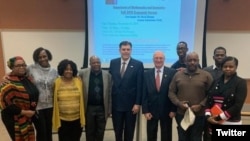Since the fall of the Berlin Wall 30 years ago, many Central and Eastern European and Eurasian countries have overcome significant social, economic, and political challenges on the path towards democracy and economic prosperity. Nevertheless, according to U.S. Agency for International Development Assistant Administrator Brock Bierman, many of these countries remain vulnerable to the Kremlin’s malign influence.
Kremlin “interference in the development trajectory and aspirations of these countries,” said Assistant Administrator Bierman,“amounts to a direct challenge to their self-determination, to their stability, and the well-being of their citizens.” The government of Russian President Vladimir Putin and its proxies interfere in elections, wage information warfare, encourage corruption, seek to marginalize and repress civil society, and undermine the rule of law.
USAID is not standing by “as the Kremlin seeks to undermine what these nations have fought so hard for,” declared Assistant Administrator Bierman. Indeed, in July 2019, USAID launched a Countering Malign Kremlin Influence development program.
As part of this new program, USAID is helping to train and equip independent journalists in the Balkans and Moldova with the skills they need to recognize and counter disinformation.
Moreover, USAID is helping to diversify European energy supply and networks available to countries affected by the Kremlin’s malign activity. Through the U.S.-Europe Energy Bridge Program, USAID is offering an alternative to Kremlin energy sources by promoting the development of energy infrastructure in the region via partnerships with U.S. equipment manufacturers and international institutions.
USAID’s Countering Malign Kremlin Influence program is also heavily focused on safeguarding judicial and democratic institutions. From Ukraine to Armenia, USAID is helping governments and civil society organizations combat corruption, improve cyber security, and enact judicial reform.
Mr. Bierman emphasized that this program should not be construed as working against the interests of the Russian people. “The Russian people still want the same basic rights and opportunities that we all want. They want to leave behind a better future for the next generation,” he underscored.
“Strong democracies and prosperous economies in Europe and Eurasia can light the way for them.”
“America’s interests,” said Mr. Bierman, “are best served by partnerships with free and independent people who can join us as equals to promote the wealth and security of one another.” Strong democracies and prosperous economies are an example to autocratic governments everywhere that freedom works.






